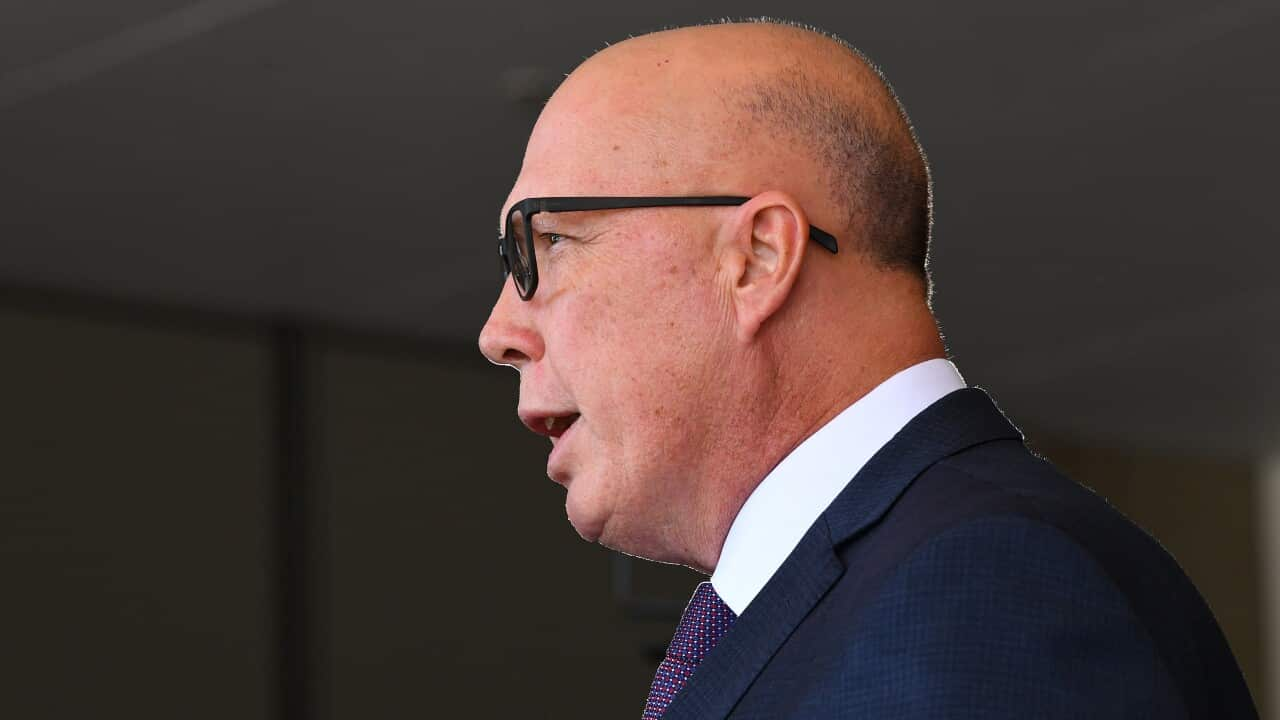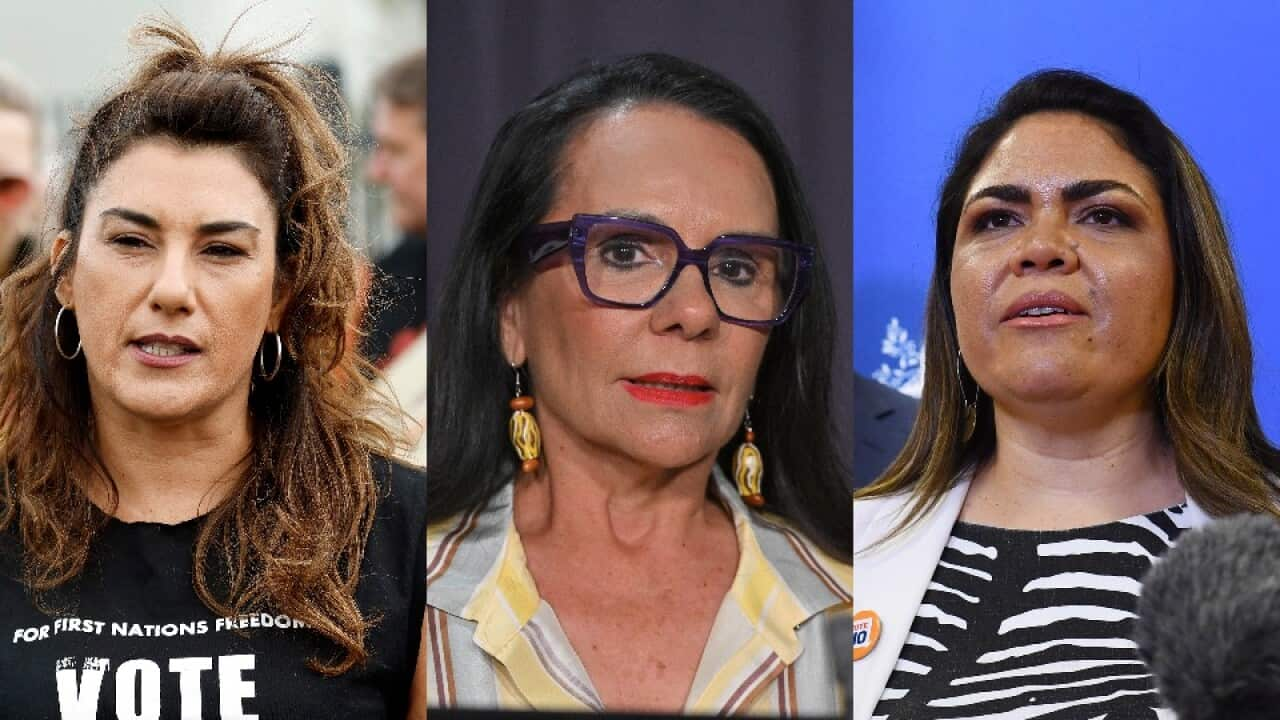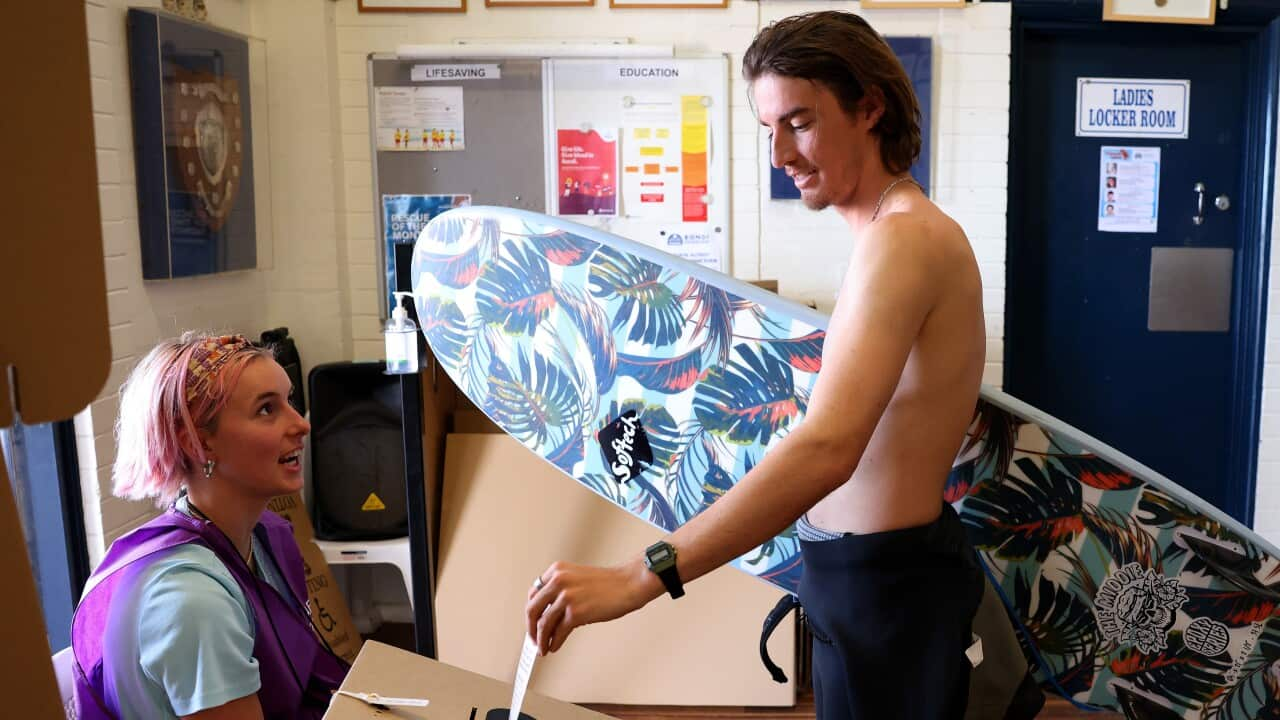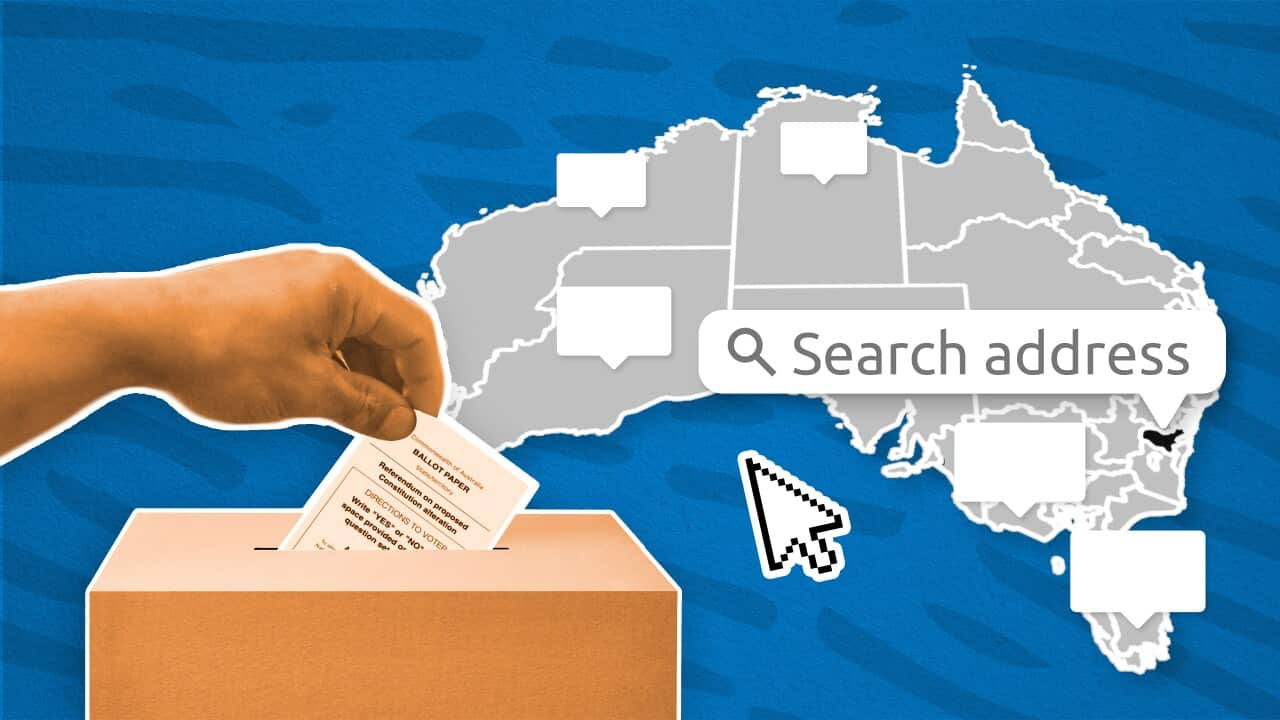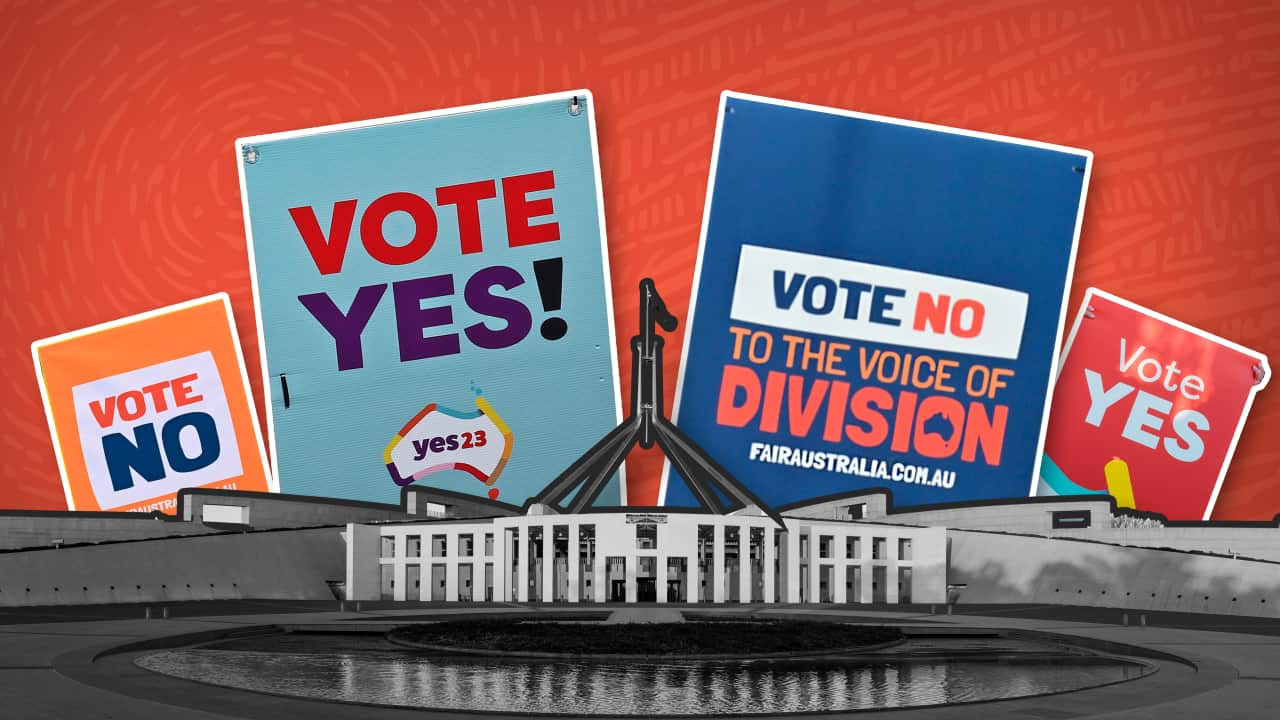

9 min read
Feature
A year after the Voice referendum, First Nations leaders are 'continuing on heartbroken'
Much of the work on pursuing Treaty and Truth in the last 12 months has come from state governments and community organisations.
Published 13 October 2024 6:43am
Updated 13 October 2024 10:38am
By Madeleine Wedesweiler, Ewa Staszewska
Source: SBS News
Image: The government has been accused of inaction on Indigenous policy, 12 months on from the Voice referendum. (SBS News)
When the Indigenous Voice referendum was voted down on 14 October last year, Aboriginal leader and academic Marcia Langton declared "".
Just over 60 per cent of Australians voted No to enshrining an Indigenous Voice in the constitution, with every state and territory excluding the ACT rejecting the proposal.
But a year on, many Aboriginal and Torres Strait Islander people remain hopeful of reconciliation.
Indigenous Australians Minister Malarndirri McCarthy this week described the anniversary as a "time of reflection".
"I certainly reflect on the six million Australians who supported [the referendum] and the incredible work of those who lobbied for the Yes vote in the affirmative," she told the ABC's Afternoon Briefing program.
"But, of course, we did not win and one of the things that I have certainly been focused on is how we move forward."
In the year since the referendum, Prime Minister Anthony Albanese has promised to continue work on Indigenous rights.
But critics say he has handed over his 2022 election promise — committing the Uluru Statement from the Heart in full — to the state and territory governments, making them responsible for the path set in 2017; Voice, Treaty, and then Truth.
One of the key pillars of the Uluru Statement is the establishment of a Makarrata Commission to oversee "a process of agreement-making between governments and First Nations and truth-telling about our history".
In June, the Greens to establish an Indigenous truth and justice commission, which would operate in a similar way and which Labor has supported, though the bill has yet to pass both houses of parliament.
However, at the Garma festival in Arnhem Land in August, Albanese appeared to shift his language on Makarrata and stopped short of committing to a formal, following the axing of $20 million previously set aside for it in the federal budget. Treasurer Jim Chalmers had told NITV in May that the funding would be reallocated to Closing the Gap measures.
In a statement, McCarthy told SBS News: "I remain proud that the government delivered on our commitment to First Nations people to take the Voice to a referendum.
"As a government, we remain committed to the principles of truth-telling and Makarrata".
What do people think about the Voice referendum one year later?
Mixed feelings continue to be felt among First Nations communities.
Speaking with SBS News, key Yes campaigner Tom Calma says reconciliation is "still alive and well", but adds "we are still there trying to inform the community of why the referendum was so important".
"All we can say is that 6.2 million people did vote Yes across the nation; we had over 60,000 people who were supporters and allies in the movement and Reconciliation Australia is helping to keep the fire burning."
Thomas Mayo, another prominent Yes campaigner and the national secretary of the Maritime Union of Australia, is less optimistic.
"I think we're in a place where the forces that worked against Indigenous recognition are trying to take us backwards," he tells SBS News.
Mayo points to as well as continuing "disinformation about almost anything positive in Aboriginal and Torres Strait Islander affairs".
Bridget Cama is the youth co-chair at the Uluru Dialogue and says although she's spent much of the past year in mourning, she is now feeling optimistic about the path forward for Indigenous advancement.
"I admit it hasn't been an easy journey. For a lot of mob, our organisation has to go back out and talk to them about the No vote, and talk about the fact that it wasn't just racism or it wasn't just bipartisanship — it's very complex."

Bridget Cama is a Wiradjuri First Nations and Pasifika Fijian woman and co-chair of the Uluru Youth Dialogue. Source: AAP / Bianca De Marchi
"I guess I'm driven by the fact that I want to leave a better future for my son and my little sister and other kids and future generations to come," she says.
"I want this to be resolved in my lifetime because I want to leave a better future for them and don't want them to be having the same conversations that we're having today."
Cama says young people, who were among the biggest supporters of the Voice referendum, are integral to achieving social reform.
Where is Voice, Treaty and Truth making progress?
Much of the progress on Voice, Treaty and Truth-telling has been led by state governments and community organisations.
South Australia's, which was legislated before the federal referendum, announced the members of its inaugural advisory body in June.
The 12 came from 46 seats across six local Voice regions, voted in by South Australians.
Also predating the referendum, the Victorian Parliament introduced treaty legislation in 2018, becoming the first state or territory to do so.
The First People's Assembly of Victoria (FPAV), a democratic voice for Aboriginal and Torres Strait Islander people, says it's preparing to negotiate a statewide treaty to tackle big-picture structural reform at a state level.
"We've notified the Treaty Authority — the independent umpire in the process — that we're ready to sit down with the Premier and start negotiating this Statewide Treaty," FPAV said in its latest annual report.
Over the border, the NSW Human Rights Commission appointed Treaty commissioners in September to consult with Indigenous communities as to whether they want a treaty process and what it might look like.
Treaty discussions have also been held in Queensland, Tasmania, the Northern Territory and the ACT.
Where is it at risk?
In Queensland, the pathway to Treaty is more complicated and hinges on two elements.
An Indigenous Truth-telling and Healing inquiry was established in July to understand and disseminate an accurate account of history and the lived experiences of Aboriginal and Torres Strait Islander people in the state. Meanwhile, the Queensland-based First Nations Treaty Institute is working on a framework for the treaty.
Inquiry chair Joshua Creamer concluded that a Liberal victory at this month's state election would put the "inquiry at stake" after Opposition frontrunner David Crisafulli backflipped on his support for Path to Treaty last October, labelling it "not the right way forward for Queensland".
The Indigenous barrister told SBS News it would be "devastating for the community to lose it".
"I think it'd be particularly disappointing for those people who are prepared to tell their stories … to lose that opportunity, which really you can't say [is] ever going to come around again," Creamer said.
At a national level, Mayo says First Nations people "aren't happy that the government has softened their stance in furthering Indigenous rights".
He has urged the government to stand up to the "intimidation" tactics of the Opposition and deliver on prior commitments, including the Makaratta truth-telling commission.
"I think they would win more support than they would lose votes. Why would we not want truth-telling in this country where the alternative is ignorance?"
Mayo highlights that most as "they wanted a Voice".

Thomas Mayo is a Kaurareg Aboriginal and Kalkalgal, Erubamle Torres Strait Islander author. Source: AAP / Dan Himbrechts
"Should there be a change of government next year, you can bet your bottom dollar that the Opposition [will] undermine what Labor's done."
"Then we go backwards again. And that's why it was so critical for the Voice to get up."
The Opposition and other parties need to work with the government in an apolitical way to be able to see advancement for Aboriginal and Torres Strait Islander people, he says.
The Liberal Party has previously supported symbolic recognition and a legislated Voice.
However, it opposes Treaty and Truth-telling efforts.
Where is nothing happening?
Western Australia returned the third highest No vote nationally, behind Queensland and South Australia — 97 of the state's referendum polling stations recorded a 'No' vote of more than 80 per cent.
The state has not committed to a Treaty or Truth process.
What do people hope for?
Calma says First Nations people still need to have their voices heard, particularly "our youth".
"This is about them. This is their future and we need to hear what they want and how they think things need to happen," he says.
"So privileging the voice of youth is important and we need to create the capacity to do that and also the opportunity to do that."
Mayo says the spirit of Aboriginal and Torres Strait Islander peoples has endured the failed referendum.
"They're continuing on absolutely heartbroken," he says.
"But I've seen so much of that spirit that led us to winning equal wages in this country, where we were once only paid in rations, native title and land rights and the steps towards justice that we have had the right to vote. So for those reasons, I'm feeling hopeful."
He is urging allies to get behind continued efforts for Voice, Treaty and Truth, and remains optimistic for one "simple and reasonable" demand."That we should have justice and recognition in this country."
Correction: A previous version of this article said that one in six Australians voted No to enshrining an Indigenous Voice in the constitution. This has been corrected.
